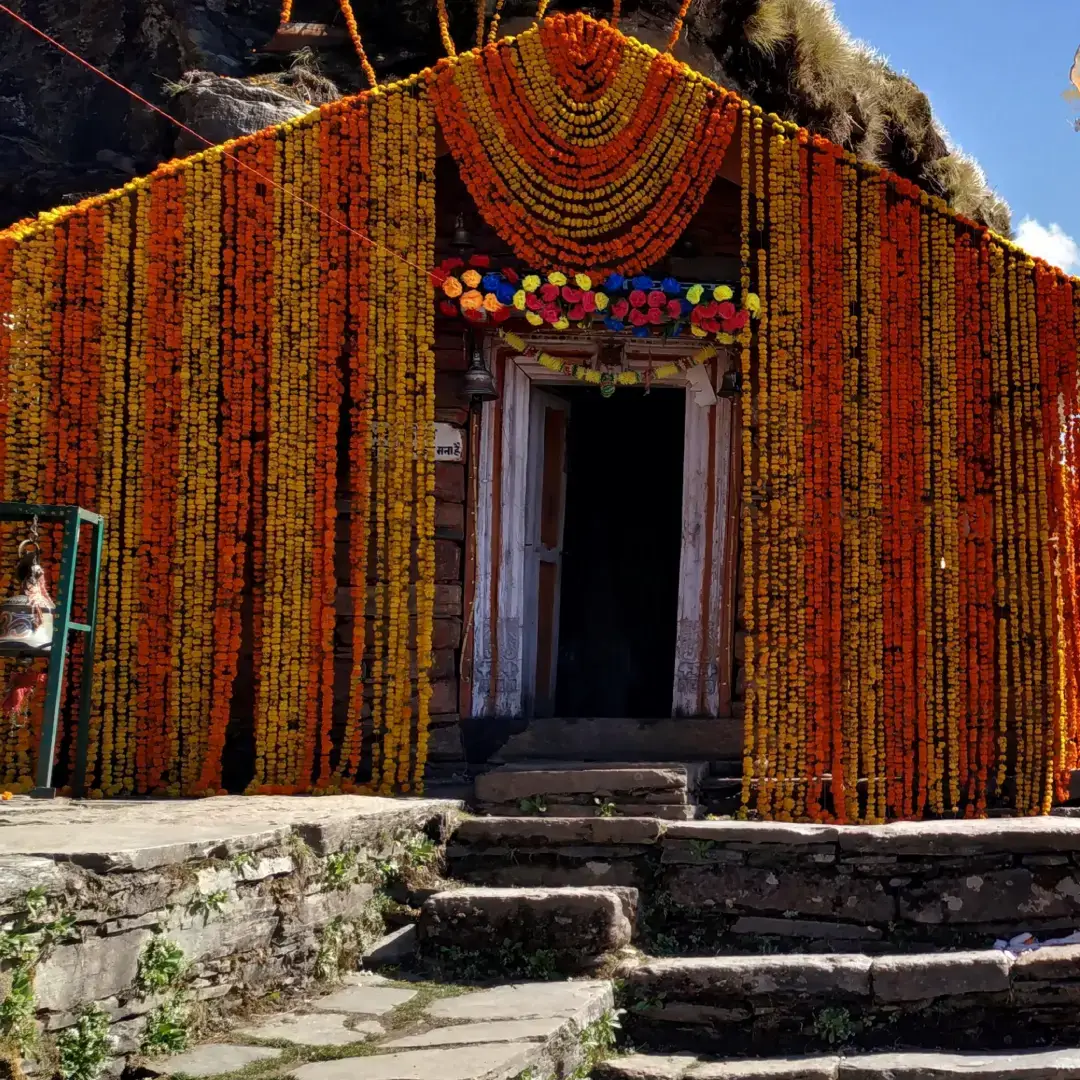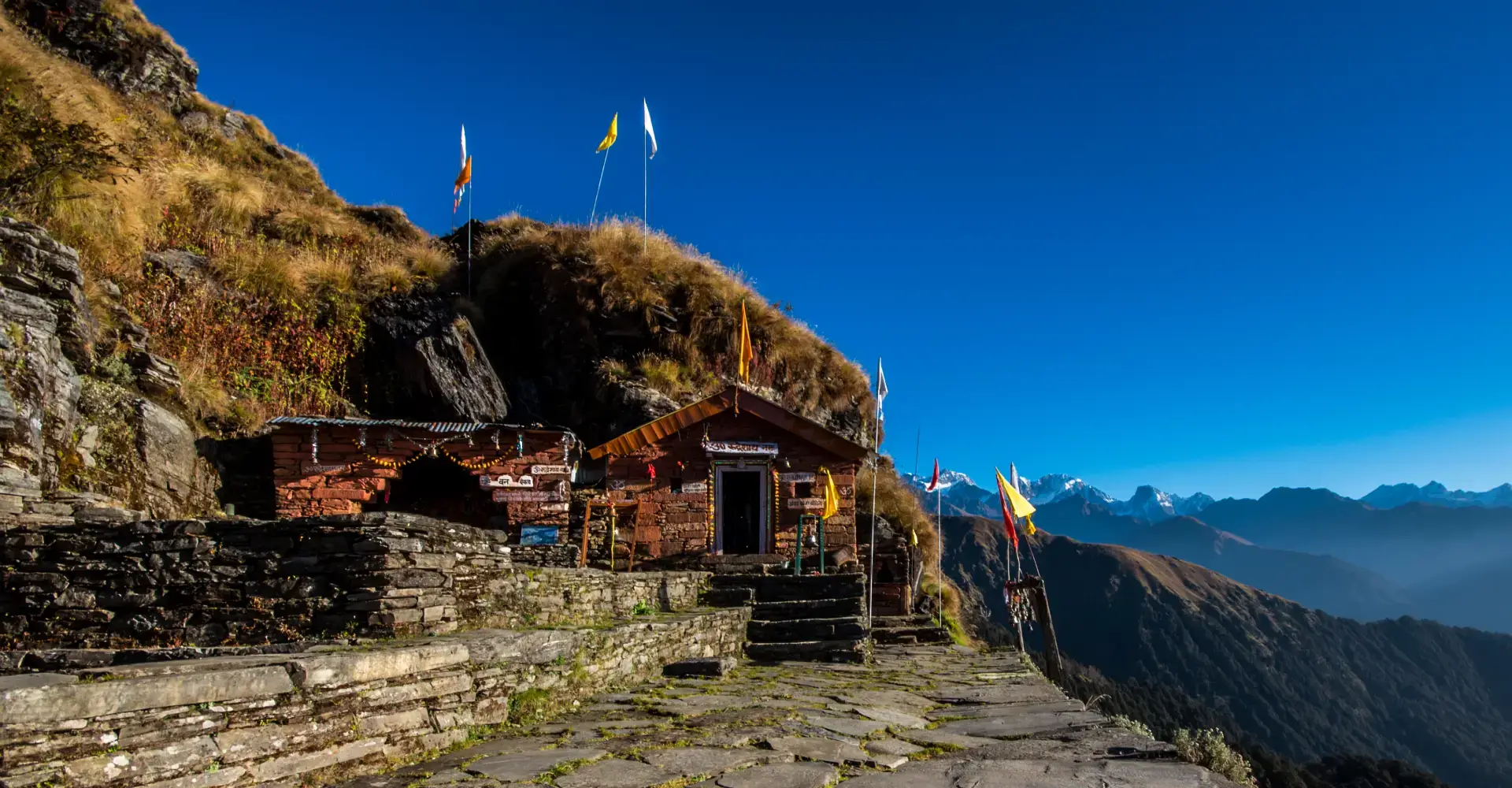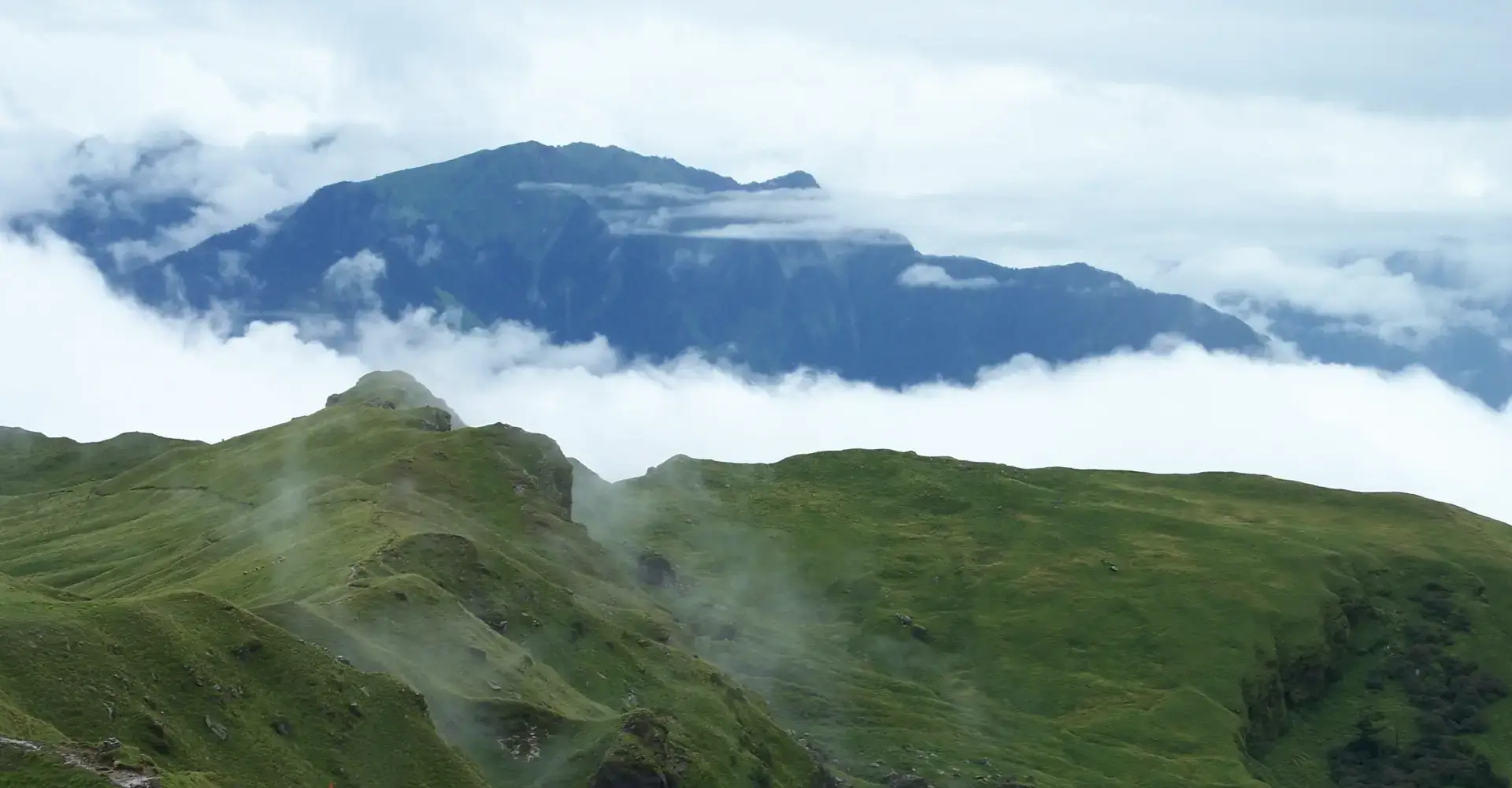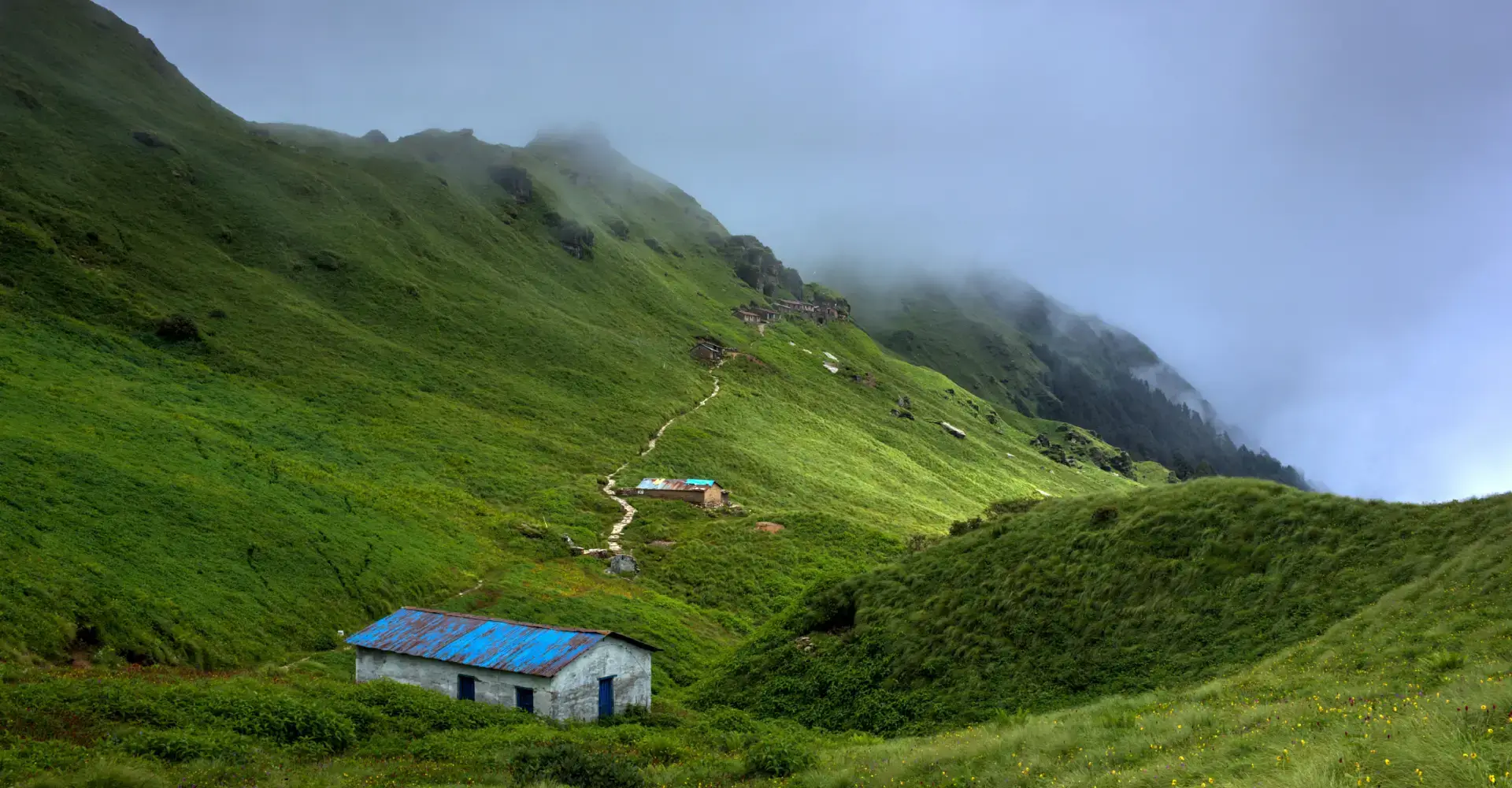Rudranath temple is one of the shrines of the Panch Kedars and is situated in the Garhwal Himalayas, dedicated to Lord Shiva. Located at an altitude of 3600 meters in Uttarakhand, this is a popular Lord Shiva temple in the Himalayas, famous for its scenic beauty and even more for the spirituality it generates.
The distinct feature of the temple is the idol that shows Lord Shiva’s face protruding out of the stone. Rudranath is enveloped in dense forests, verdant meadows, and snowy mountains, providing comfort to the followers and trekkers alike.
As it is an uphill task to reach the venerated temple, the pilgrimage brings along a sense of adventure for the spiritual individuals and nature lovers.

The Rudranath temple, which lies on the Panch Kedar Yatra circuit, is of great mythological and historical importance. As myth goes, after the Kurukshetra war, the Pandavas turned to the Lord for forgiveness, but Lord Shiva did not want to face them. He took the form of a bull and, while fleeing, managed to scatter his form out throughout all of the Garhwal regions. It is said his face appeared around Rudranath, consequently making the place a center of worship.
The history of the temple is about devotion and perseverance. Its foundation is said to have been built by the appreciators of the temple, who had seen it in visions long ago. For many centuries, the daring pilgrims have undergone all sorts of hardships to come to this temple. The remote geographical location of the temple helped in its conservation, thus preserving the original historic features. Today this edifice is donned with rich traditions and faith in Lord Shiva, and people come to worship and admire its beauty from all over the world.
The Rudranath Temple complements its surroundings very well in terms of architecture, as it embodies modesty and devotion. The temple, constructed in a basic North Indian style, is made of stones sourced nearby that easily integrate into the harsh mountain terrain. The sanctum contains a rare, breathtaking view of natural rock sculpted into the form of Lord Shiva’s face.
The temple, situated in the mesmerizing greenery of captivating snow-covered meadows and mountain ranges, is an epitome of peace and divinity within. The building itself is a simple stone structure, but the interiors are embellished with numerous decorations and gifts brought by pilgrims throughout the ages. Its rough and unrefined appeal corresponds perfectly to the wild nature of the place. Statues of small deities are placed outside of the temple along with a clear water tank called ‘Surya Kund’ contributing to the overall spirituality of the place. The simple but deeply powerful architectural style of the Rudranath Temple allows the visitors to focus on the divine presence and the incredible beauty of the surrounding nature.

Rudranath Temple is one of the must-visit religious places in Uttarakhand and is highly significant in the tradition and practice of Hinduism. The temple that is devoted to Lord Shiva is one of the panch kedar temples where the face of Shiva is said to have fallen. Devotees are of the view that visiting Rudranath temple, and the other Panch Kedar shrines, washes his or her past sins and opens the gate of salvation.
In addition, the temple holds importance because it is an integral part of the Char Dham yatra. The activities carried out here, such as praying to Shiva and performing puja at peripheral kunds like Surya Kund and Chandra Kund, would cleanse the spirit of devotees. The distant and calm location enriches the spirituality of the place, as the worshippers are able to immerse themselves in the almighty. To the followers of Lord Shiva, Rudranath Temple is not only a place to visit, but it is also a pilgrimage, which is quite a journey of faith and devotion.
Rudranath Temple is open for pilgrims only during certain times of the year because of the high altitude and harsh winters. The temple is usually devoted to worshippers in the spring season, mostly from mid-May or early June, depending on the climatic changes. The opening is celebrated with rituals and ceremonies performed by local priests.
As the winter begins in mid-October, the temple will be closed. Within this time frame, the idol is shifted to the village of Gopeshwar, where it is worshiped till the end of the winter. Journey to the temple can be done only in the active months of the temple because winter deposits snow on the trails.
Travelers with the intention to visit should take note of the above timing so as to take part in the divine setting and the ceremonies. Traveling to the temple in the operational months does come with a special spiritual experience, especially with the unspoilt nature of the Garhwal Himalayas. Also, opening and closing annual events are full of enjoyable culture that should be experienced.
| Opening Date | Closing Date |
|---|---|
| 18 May 2025 (Tentative) | November 2025 |
The optimal period for visiting Rudranath Temple is between May and October, which also happens to be the period when the temple is open for pilgrims. The temperature and weather at this time are very conducive for the pilgrimage and the climb. Most landscapes from spring to early summer (May to June) are clear with numerous blooms of high-altitude plants, trees, and carpets of green vegetation, which beautifies the temple area.
There is a high risk of heavy downpours between July and August, and therefore this period should be avoided as it renders the trekking paths muddy and very dangerous. One more good season is the post monsoon, which comes between September and October. The weather is cool, the scenery is colorful, and there are fewer people.
Exploring Rudranath temple at this time is supplemented with breathtaking views of the snowy Himalayan peaks and green pastures. Mountain weather is unpredictable, and forecasts should be considered and necessary preparations made. The peaceful surroundings and the divine energy present in the atmosphere turn out to be an experience worth cherishing for the devotee or the explorer for the very first time.
Rudranath Temple is reached through different means of transport and a fair amount of trekking as well. The closest town is Gopeshwar, and it is also well linked by roads with the cities of Uttarakhand. From Gopeshwar, one is supposed to undergo a steep trek of around 20 kilometers.
The Rudranath trek can also be commenced from other villages like Sagar or Mandal, and the trails pass through thick forests, high pastures, and picturesque scenery. ood physical fitness and trekking equipment are required for the journey. Since there is no road leading to Rudranath, the views along the trek and the spiritual aspect make the journey worthwhile. There are local guides to help with directions and other logistical issues.

Rudranath Temple, situated in the midst of the majestic Garhwal Himalayas, is not merely a location; rather, it is where the countless untouched beauties of Uttarakhand can be explored. Here are some of the places in and around Rudranath that are worth visiting to enhance your travel experience.
A short trek from Rudranath lies Panar Bugyal, a beautiful alpine meadow that offers the view of the white-capped hills of Trishul and Nanda Devi. Its green patches are filled with numerous colors of wild flowers, creating a picture-perfect location for camps or just to laze around in the lap of Mother Nature. It is every photographer's most loved place, especially during dawn and dusk.
It is a small village situated in dense forests, which is where the number of treks to Rudranath starts. This village gives the visitors an opportunity to enjoy the garhwali hospitality and culture completely. The simple living, traditional houses, and tranquil surroundings give a much-needed break before or after your trek.
The Anusuya Devi Temple, located close to Mandal (5 km from Rudranath), is an ancient temple devoted to Goddess Anusuya. The temple is an essential pilgrimage site and is surrounded by green forests. A gentle trek leads towards the temple. It is said to be the place where Sati Anusuya did penance and is best suited for someone who is in search of solace and divinity.
Kalpeshwar is one of the five shrines of Panch Kedar temples, where devotees revere Lord Shiva's hair. In contrast to Rudranath, there are no closure periods to Kalpeshwar, thus it can be easily incorporated in your travel plans. The temple is tiny yet very important and is filled with greenery and breathtaking mountains.
A beautiful high-altitude lake close to Rudranath, Nandikund is an untouched treasure. The crystal-clear waters of the lake and its peaks create a dream-like scenery. It is also of mythological importance and is considered the place where Nandi, the lord Shiva’s riding bull, went to a lake to drink. The journey to Nandikund is strenuous, but every bit of the work is worth it in the end.
In case there is still time, it is advisable to make a trip to the world’s highest temple of Shiva Tungnath and also the peak of Chandrashila, which has breathtaking views of the range of the Himalayas within its vicinity. Both these places are near Chopta, which is commonly referred to as the “Mini Switzerland of India,” and are a few hours’ drive from where the Rudranath trek commences.
Gopeshwar, the base town for the Rudranath trek, is also worth checking out. The town houses the ancient Gopinath Temple, which is a shrine to Lord Shiva. The temple ils a quiet place due to its amazing woodwork on the walls and religious atmosphere. This town also acts as an entrance to other temples of Panch Kedar.

To sum up, take these tips and make your trip to Rudranath Temple an exciting, enjoyable, and dedicated one.
Get up to 30% early bird discount on Char Dham Yatra Tour Packages for 2025 bookings.
Explore various options for Ek Dham Yatra tour packages as well as Badrinath, Kedarnath, Gangotri, and Yamunotri Dham tour packages